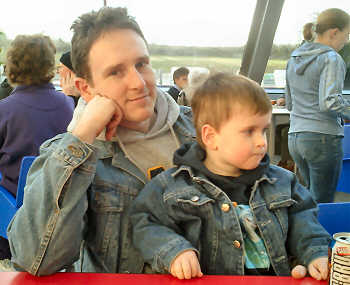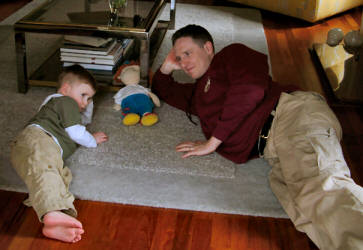March has been an extraordinarily busy month for us–hence the lack of postings, reviews, et al. First we had Julian up from Down South for a long weekend; then Kenny came to stay for a short week before he bounced off on his tour of Europe; and now we’re in the middle of Susan’s two-week visit to see her new granddaughter. At the start of the month, Penicuik enclosed and glazed our porch, and Abi spent a lot of time and effort tiling it and putting up a coatrack, a new house number plate, and a doorbell. Alex decided that the coming of spring heralded the era of the Potty, and has been peeing like a big boy and wearing big boy underwear for a week now. Still a bit anxious about the poo, though. (I’ll leave you to guess how much fun that is. The question of how much negative reinforcement to apply is also a difficult one.) And I’m still working a full 40 hour week some distance away. (Aww, diddums.)
(Actually, the 40 hour week is more than I have done for about three years. After Alex was born in 2001, I was working a four-day week at Cedalion. At the ill-fated Tribune I was working five days, but the days were 7 hours, and the commute was a 15-minute bike ride. I can’t say that I’m happy about giving up part-time work. Everyone has their own comfort zone in the time-money continuum, and I feel like I’m out of mine right now.)
So anyway: most of my spare time right now goes into parenting. I’ve cut out a lot of dead weight from my RSS subscriptions, but I still can’t even keep up-to-date with reading my favourite sites. The idea behind my new Alphasmart is that it will allow me to wring the odd paragraph out of the tiny niches of time scattered throughout my day. (The fact that it has enormous geek toy value has nothing to do with it, of course.) March is a write-off, though. Maybe in April….
Oh yeah, and I’ve joined a gym. I’ve put on all the weight I lost during last year’s diet, and then some. Solution: eat less, and get more exercise. Screw Atkins. Been there, still have the psychic scars from the bread deprivation. Just getting removing all the gratuitous chocolate from my daily intake is going to shave a substantial number of calories from my weekly intake.
(“Gratuitous” chocolate: the Kit-Kats, Snickers, Rolos, Toblerones, etc. that just happen to fall into my shopping basket at the newsagent, supermarket, or sandwich shop. Sometimes they even jump right out vending machines into my surprised arms. Imagine that! Gratuitous chocolate is different than “Planned” chocolate, which covers the use of chocolate in home baked cakes and cookies, desserts at restaurants, and munchies at the cinema. I trust that all you chocoholics are with me on this distinction.)
Still, exercise is needed, and cycling to the cinema with Alex once a week isn’t going to cut it. I can’t see myself using the gym much more than once or twice a week, but they also do Tae Kwan Do classes. I’ve fancied giving TKD a go for some time, and attending a class might encourage me into a proper routine. We’ll see how it goes.
After swearing blind last year that I would never use Mozilla Mail again, I find myself in the process of migrating to the Thunderbird mail client. It’s clean, tidy, and fast. Outlook was starting to feel all big and bloaty and slooooow to start up. But a lot of applications are doing that right now, so it’s probably time to rebuild my computer again. Especially as I’ve only got about 1.5GB left on my 80GB main drive, and 2.5GB on the 80GB backup drive. It’s a good thing that you can pick up a 250GB drive for under £150 these days. And seeing as the only practical way to back up a 250GB hard disk is another 250GB hard disk, I find myself trembling with geeky joy at the thought that pretty soon I might be running my PC with half a Terabyte of storage under the hood.
“More than a single person will even need,” yada yada. It’ll probably last me a year, tops. (Hello Virtual Machines!)
Oh, you want some photos, too?
Bedtime now.

